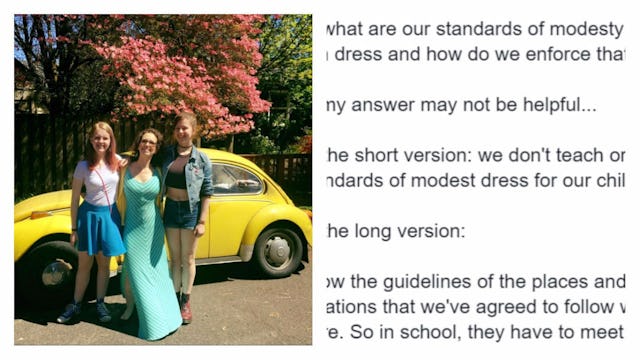This Mom Nails Why Teaching Girls To Dress 'Modestly' Is Bullsh*t

Mom and popular blogger says she won’t teach her daughters to dress modestly
When was the first time your clothes were criticized? Were you a young girl when someone told you to “cover up?” Were you school-aged when someone said your shorts were “too short?” Were you a teenager when someone said the length of your skirt made you look like you were “asking for it?”
If you’re a woman you’ve undoubtedly heard some version of these judgements and felt the sting of their negative implications. Which is precisely why one Portland mom refuses to make her daughters follow modesty rules.
Popular blogger and mom of six daughters, Jessica Martin-Weber, should teach a class on why shaming girls and women for “revealing” clothing is not only wrong, but damaging. Martin-Weber, who runs a family blog with her husband Jeremy called Beyond Moi, posted a powerful and poignant explanation on why she doesn’t teach her daughters to dress modeslty. The Facebook post is going viral because holy crap, just read, she nailed it.
“Modesty is too subjective and true modesty is about attitude and our heart,” she writes. “To us, enforcing modesty standards is about controlling people and we have found that is counterproductive and undermines our commitment to respecting bodily autonomy.”
Preach, sister.
She explains that the term “modest” is extremely arbitrary because its definition is different in different cultures, religions, and societies. Furthermore, what is considered modest changes throughout generations and history. What’s modest to you, might not be modest to someone else. To prove her point, Jessica posted a picture with her explanation:
“…some would consider what I am wearing modest, others wouldn’t (growing up that dress wouldn’t have been acceptable because of the neckline and slit and the cling of the fabric),” she continues, “some would be comfortable with my daughter in the blue skirt, some wouldn’t, and some would seen nothing wrong with my daughter’s crop top outfit and shorts, some wouldn’t let their child leave the house dressed like that.”
And that’s what you call being spot on, folks. In our modern world, parents of girls (and boys) are trying to raise kids that love their bodies for what they can do and not how they look. We’re trying to teach our kids to be themselves, be unique, and self-express.
Jessica explains that her children follow the dress code at school, but otherwise, can wear what they want. She encourages them to consider six practical questions about their clothing choices, none of which have anything to do with someone’s fickle idea of propriety.
- Can you participate in the activities you will need to do without worrying about your clothing?
- Is it practical for the weather?
- Will the clothing you wear seem out of place in that setting or will it communicate respect for where you are and who you are with based on the social norms of that setting? (Think of an orchestra performance versus a rock concert, a funeral, a wedding, or catching a movie versus attending a theatre performance.)
- Are YOU comfortable with the parts of your body that are showing and that others may notice those parts and though we are not responsible for the actions of others, how will you feel if someone says something about that?
- Can you tell me what inspired you to pick that outfit and what you feel it expresses about yourself and communicates to others?
- Are your genitals adequately protected and safe from accidental harm or accidental exposure?
Jessica then gets very personal and vulnerable in her post. She explains why shaming our girls for how they dress is not just outdated and sexist, it’s harmful.
“When I was sexually assaulted as a teen I was ashamed to tell anyone in part because I had worn something that was more form fitting and blamed myself for what happened,” she writes. “If only I hadn’t been wearing that, I thought, this wouldn’t have happened. Never mind that he was my boyfriend and it happened several times no matter what I was wearing.”
Imposing these modesty standards on young girls and women destroys confidence, it perpetuates the false idea that wearing certain clothes means you’re an attention seeker, and most detrimentally, it contributes to rape culture. If you’re wearing clothes that show your skin you must be “asking for it.” It’s a way of thinking that’s wrong as hell, and as Jessica points out, a sexual assaulter or rapist will hurt you regardless of what you’re wearing. Then they’ll use how you dress to justify their disgusting actions.
Jessica says she doesn’t regret her decision at all and adds, “…we will not overpower their autonomy and will show them the respect they deserve as individuals that does not hinge on what they wear but rather their personhood.”